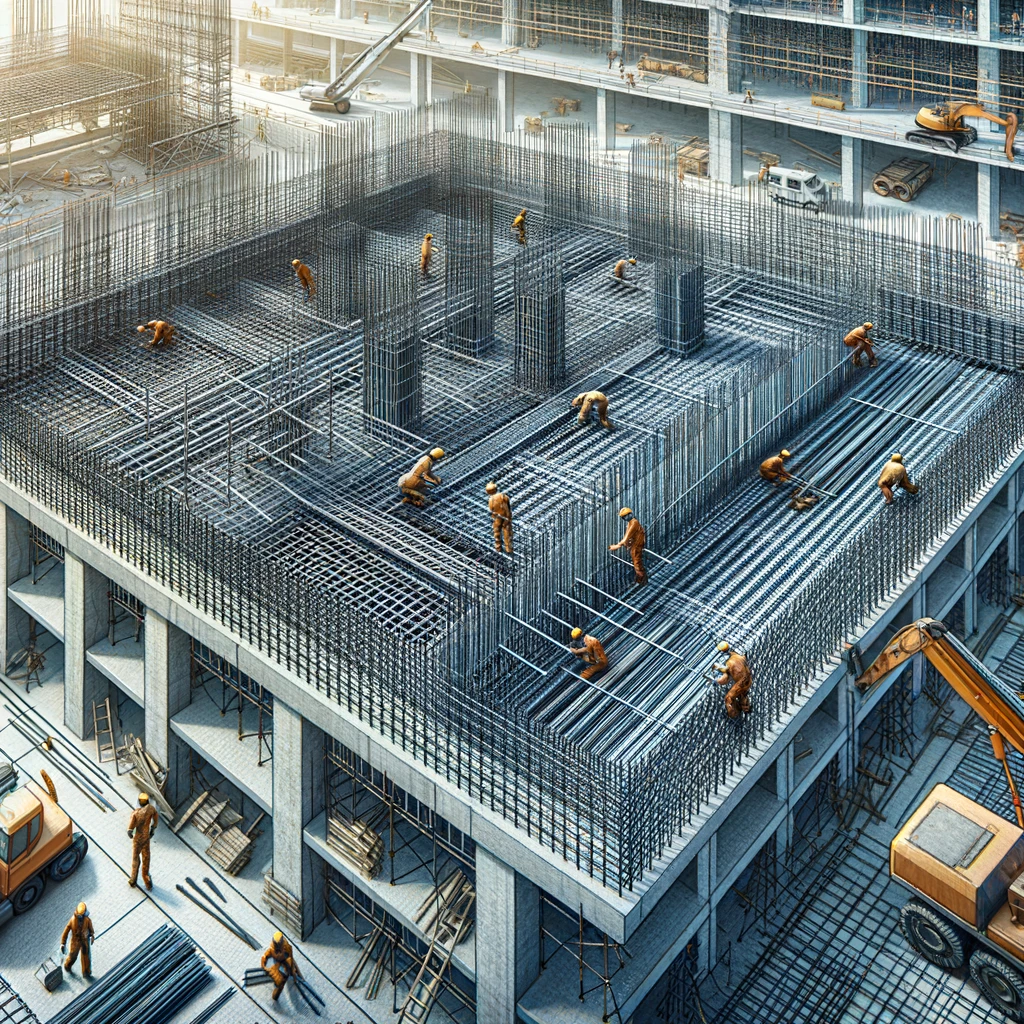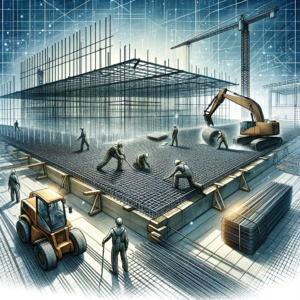
Unveiling the Benefits of Welded Wire Mesh Over Rebar
Introduction
In the ever-evolving world of construction, championed by pioneers like California Wire Products, the quest for stronger, more efficient building materials remains at the forefront of industry priorities. Reinforcement, a crucial component in prolonging the lifespan and enhancing the structural integrity of constructions, has traditionally seen a competition between two main players: Rebar and Welded Wire Mesh (WWM). This blog aims to delve into the comparative advantages of Welded Wire Mesh over its more conventional counterpart, Rebar, exploring the wire mesh vs rebar debate and illuminating the path for future construction endeavors.The Essence of Reinforcement
The very foundation of modern architecture’s durability and resilience is deeply anchored in the often overlooked hero of the construction world—reinforcement. Serving as the critical backbone, it not only supports but adeptly distributes the burdens placed upon our buildings, ensuring they stand tall against the relentless tests of time and the unpredictable forces of nature. In this pivotal exploration, we delve into the heart of the rebar and wire mesh debate, shining a spotlight on the two predominant champions of reinforcement: Rebar, with its traditional strength and adaptability, and Welded Wire Mesh (WWM), known for its innovative efficiency and versatility. This discourse is not merely an academic comparison but a quest to uncover the potential of WWM to revolutionize our construction practices, potentially marking it as the superior choice for future projects that aim for longevity, safety, and cost-effectiveness.Understanding Rebar
1. The Backbone of Construction
Rebar, an acronym for reinforcing bar, stands as a quintessential component in the construction industry, crafted from steel bars or meshes of steel wires. It plays a pivotal role as a tension device within reinforced concrete and masonry structures, imbuing them with necessary tensile strength. This material has been a cornerstone in construction for decades, acting as the crucial backbone to concrete structures across the globe. Its application spans a vast array of projects, from towering skyscrapers to sprawling bridges, underscoring its integral role in ensuring the structural integrity and longevity of modern architecture.2. Strengths and Weaknesses
The prominence of Rebar in the construction sector is largely attributed to its remarkable strength and flexibility, characteristics that enable it to support and reinforce concrete structures effectively. This versatility allows it to be shaped and used in a variety of configurations, catering to the specific demands of each project. However, the benefits of Rebar are tempered by significant challenges. The process of installing Rebar is known to be labor-intensive and time-consuming, posing logistical challenges in a world where construction timelines are increasingly compressed. Moreover, a notable vulnerability of Rebar is its susceptibility to corrosion over time. This inherent weakness can lead to a degradation of structural integrity, necessitating maintenance and, in some cases, premature replacement. Such concerns have fueled the ongoing rebar or wire mesh debate among construction professionals, prompting a reevaluation of traditional reinforcement methods in favor of more innovative solutions that might offer enhanced durability, efficiency, and cost-effectiveness.Welded Wire Mesh (WWM) Unveiled
1. A Modern Reinforcement Solution
Welded Wire Mesh (WWM) represents the evolution of reinforcement materials, providing a grid of wires meticulously welded at each intersection to form a robust structure. This innovative approach not only offers a homogenous and consistent reinforcement solution but also introduces a level of precision and strength previously unattainable with traditional methods. Its introduction into the market has significantly shifted the dynamics of the wire mesh vs rebar debate, making WWM an attractive alternative for those seeking to enhance the durability and reliability of concrete structures. The uniformity in its design ensures an even distribution of stress, thereby reducing the likelihood of structural weaknesses and failures.2. The WWM Advantage
The advantages of Welded Wire Mesh extend far beyond its structural capabilities, offering a comprehensive solution that addresses several logistical and financial challenges inherent in construction projects. One of the most notable benefits of WWM is its potential to drastically reduce labor costs. Its prefabricated nature allows for rapid installation, significantly cutting down on the time and manpower needed to lay traditional reinforcement. Additionally, WWM enhances structural integrity by ensuring a consistent, uniform reinforcement throughout the concrete, which is critical for maintaining the longevity and safety of a structure. Despite its numerous benefits, WWM does present some limitations, such as reduced flexibility in comparison to Rebar, especially in projects requiring complex shapes and configurations. Nevertheless, for a wide range of applications, the advantages of WWM make it a compelling choice for modern construction needs.Benefits of Welded Wire Mesh Over Rebar
1. Cost-effectiveness
Material and Installation Costs
WWM stands out for its cost-efficiency in the rebar and wire mesh comparison. The material itself can be more economical than Rebar, and its ease of installation reduces labor costs significantly.2. Time Efficiency
Speed of Installation and Labor Time Reduction
Time is of the essence in construction, and WWM delivers by cutting down installation time and labor requirements, enabling faster project completion—a crucial factor in the rebar or wire mesh decision-making process.3. Structural Integrity
Enhanced Load Distribution
WWM offers superior load distribution, minimizing the risk of cracks and enhancing the durability of concrete structures, tipping the scales in the wire mesh vs rebar debate.Resistance to Cracking and Shrinkage
Its design and structural properties make it resilient against cracking and shrinkage, pivotal for long-term stability.4. Flexibility in Design
Adaptability to Various Shapes and Sizes
The versatility of WWM allows it to be customized for specific project needs, offering flexibility unmatched by traditional Rebar, and adding a significant point to the rebar and wire mesh discussion.Considerations and Best Practices
When deliberating between Rebar and Welded Wire Mesh (WWM) for construction reinforcement, it’s crucial to weigh several key factors. Project scope, budget, and specific structural requirements play a significant role in determining the most suitable reinforcement option. Beyond material selection, the implementation of best practices during installation is pivotal for ensuring the optimal performance of the chosen reinforcement material. This includes adhering to industry standards for placement, coverage, and securing methods, which are essential for maximizing the effectiveness and longevity of the reinforcement within the concrete structure.Future Trends in Reinforcement Technologies
The world of construction reinforcement is on the brink of significant change, driven by the advent of emerging technologies and innovative materials. These advancements promise to redefine the standards of construction norms, offering new possibilities in terms of strength, durability, and environmental sustainability. As the industry evolves, staying informed about these trends becomes crucial for professionals looking to make educated choices in the ongoing rebar or wire mesh debate. Embracing these innovations can lead to more efficient construction processes, improved structural integrity, and ultimately, the transformation of the built environment to meet the challenges of the future.Conclusion
The comparison between Welded Wire Mesh and Rebar, brought to you by California Wire Products, illuminates a clear path towards more efficient, cost-effective, and durable construction practices. As we embrace the benefits of WWM in the wire mesh vs rebar debate, it’s crucial to consider the specific needs of each project. Consulting with industry professionals like California Wire Products can provide tailored advice, ensuring the right reinforcement choice is made for future construction success. Call us at (951) 371-7730 for more information.FAQs
FAQ 1: Can Welded Wire Mesh be used in all types of construction projects? Answer: While Welded Wire Mesh offers a versatile solution for many construction scenarios, its suitability depends on the specific requirements of each project. For instance, projects that require intricate shapes or highly flexible reinforcement may benefit more from traditional Rebar. It’s essential to evaluate the project’s structural needs and consult with an engineer to determine the best reinforcement option. FAQ 2: How does the installation of Welded Wire Mesh compare to traditional Rebar in terms of environmental impact? Answer: The installation of Welded Wire Mesh tends to have a lower environmental impact compared to traditional Rebar. This is due to its prefabricated nature, which not only reduces on-site waste but also minimizes the energy and resources required for cutting, bending, and tying Rebar on-site. Additionally, the efficiency of WWM installation can lead to a reduction in overall project carbon footprint. FAQ 3: Are there any advancements in Welded Wire Mesh technology that enhance its performance in construction? Answer: Yes, there have been significant advancements in Welded Wire Mesh technology, including the development of high-strength wire materials and improved welding techniques. These innovations enhance the durability, load-bearing capacity, and corrosion resistance of WWM, making it an even more compelling option for construction projects looking for long-term reliability and performance.GET IN TOUCH
Contact us today to place your wire mesh order!


